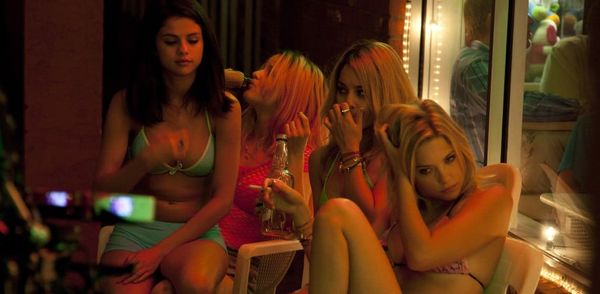Eye For Film >> Movies >> Spring Breakers (2012) Film Review

Perennial provocateur Harmony Korine is at it again, ruffling feathers and deliberately misleading (and therefore mocking) the mainstream masses with his latest assault on the senses. A timely stock-take of the values American culture has bred into its youth as well as a riposte to the post-Hangover glut of deplorable debauch-coms such as the deeply reprehensible 21 & Over, Korine leads the audience down a mesmerising garden path into a darker place than you'd think possible given the Disney starlet cast and lurid marketing campaign. With a game-changing James Franco performance and sheer sensory overload induced by Enter The Void cinematographer Benoit Debie and Drive composer Cliff Martinez’s soundtrack collaboration with Skrillex, you might not agree with Spring Breakers' unfettered indulgences or its amoral ambiguity, but scratch the surface and its layers of social commentary will resonate as much as its seductively abstract sensibilities.
Bored being skint students stuck on a nowheresville campus, four girls decide they're going to St Petersburg's infamous Spring Break celebrations no matter what it takes to get there. With Cotty's car in the garage, bad influences Brit and Candy convince her to knock a lecherous lecturer's old Camaro to use as a getaway vehicle, before donning balaclavas to rob a chicken shack at squirt-gunpoint. God-fearing Faith is horrified at their actions, but the promise of getting away sees her swept along on their mission to party in the sun with all the other bikini-clad bimbos and beer-bong-brandishing jocks. When they fall under the spell of local rapper Alien however, their trip takes them into Florida's criminal underbelly, threatening to destroy the bond between them and consume them in a web of vice.

With a deceptively calm credit sequence disrupted by Skrillex's ear-bursting dubstep, Spring Breakers opens like a sadistically sun-drenched Dustave Gore engraving from one of the circles of Hell in Dante's Inferno, with a writhing sea of naked girls frozen in the heat, trapped in self-inflicted water-boarding positions where beer is a form of torture administered by walking-hormone males. As the camera leers in slow-motion at bouncing breasts and jiggling butts of all shapes and sizes, Korine uses cheeky edits to gratuitously throw them even more in your face, a reminder that he's taking the piss as well as deliberately provoking disbelief and disapprobation.
From here the film moves in elliptical circles, adopting a disjointed, repetitious register and following a similar path to Dante's descent through the underworld as each successive party scene becomes more unhinged and eventually more dark and dangerous. Moving from chilled-out bong-hitting and tedium-alleviating toy-gun-boozing, through a messy but relatively innocuous frat party and on to the eponymous beach- and pool-side fiestas, what starts as mindless but arguably harmless hedonism soon degenerates into something increasingly sinister. As inhibitions break down and drugs come into play, the girls find themselves in potentially harmful situations, but it soon transpires that they're more than capable of handling themselves.
Apart from Faith: as the film's moral compass, former Disney sweetheart Selena Gomez gets the chance to shine more than her near-interchangeable cohorts, and it's through her that Korine keeps the first half of Spring Breakers from slipping down to the level it's emulating as much as satirising. She's the beating heart at the centre of several surprisingly disarming exchanges between the girls, expressing sentiments that we'll all have shared between friends when you're having the time of your life even though you know you might be living it on the edge and losing yourself in the process. She allows Korine to have his cake and eat it, making the most of the sparse, almost mantra-like dialogue and locating the emotion in her character's journey from shallow but sincere transcendence to a disturbing reality she's not comfortable with or prepared for.
Then James Franco's corn-rowed, gold-toothed abomination Alien enters the fray - at first from a distance - like Gilmartin in James Hogg's Confessions Of A Justified Sinner, dragging the girls down into temptation via a false sense of empowerment that is actually a classic form of control. Korine shows an unforeseen sense of near-Christian panic with his handling of this character - he's at once a devil and an angel to the girls, 'the answer to their prayers' but also Faith's (and most parents') worst nightmare. Franco is frankly note-perfect, covering all sorts of bases from goofy to menacing in the role of a lifetime, culminating in unforgettable scenes where Alien reels off to the awestruck girls all the materialistic 'shee-it' that makes up his (and implicitly many other wayward youths’) American Dream, before serenading them with a heartfelt rendition of Britney Spears' saccharine pop tripe while they prepare to fleece the Spring Breakers they've now evolved beyond.
Of course, Korine eventually flips the script to generate warped sympathy for Alien and show the girls to be equally - if not even more - corrupt than the wannabe gangsta rapper (who is at least a product of circumstance), which is probably where some viewers will feel he's losing any kind of message he was trying to convey. But dig a little deeper and there's method to his madness; he's up-ending expectations at every turn to show that the media-influenced prejudices (and idolatry) the girls share are mirrored in our own predictable reactions to his material. Some people have suggested Korine is irresponsible for not having his wife's character get raped by a room full of frat-boys, while the relative lack of repercussions for the girls seems like subversion for the sake of it, but he's succeeded in avoiding making yet another morally pandering movie-of-the-week that would likely fall on deaf ears for its target audience anyway, leaving something that lingers longer in the memory due to its probing and problematic depiction of some modern teens' alarming internet-fueled outlook.
Whereas Sofia Coppola's underwhelming The Bling Ring highlighted the West Coast teen's comparatively upwardly mobile aspirations and played down the criminal aspect, Korine highlights the East Coast and the South's fascination with a much more self-consciously grimy lifestyle. In particular, his handling of the pivotal robbery is masterful, displaying a level of self-control in capturing it in one take from the outside, before springing the shocking actuality upon audiences in flashback to jolt us out of our complacency. It should be remembered that these girls - and most of the real-life Spring Breakers they represent - are at university, so any charges of their escapades being mere dumbed-down escapism are hard to level. They worship African-American pop culture but fail to acknowledge its roots or raison d'etre; in superficially adopting its style and swagger they might as well be donning white-face for each other's ignorant amusement. They talk the talk but they'll never have to walk the walk, and Korine is unrepentant in highlighting the racial hypocrisy at play, having his girls ignore a history lesson about Jim Crow before they embark on their ghetto-dream odyssey.
The action becomes exponentially more uncomfortable through the coiled racial tension and occasional gender reversals, from the girls sexually threatening Alien to a drive-by upon them being committed by an uncaring black female. With the introduction of Alien's bitter rival - and once best friend - Archie, Korine pulls another sucker-punch, having him played by notorious real-life 'trap-rapper' Gucci Mane, who's perpetually under the media's gaze as he tumbles in and out of jail for alleged involvement in everything from drugs to actual gang murders. This might seem like yet more stunt casting if Mane wasn't so magnetically malevolent, and his righteous indignation at these interlopers mowing his lawn forces the viewer to consider how white entitlement doesn't just see people grasp above their station, but beneath it as well.
Rachel Korine, Vanessa Hudgens and Ashley Benson have been criticised by some for being indistinguishable from each other, but Korine's Cotty effectively works as the sympathetic middle-ground between Faith and the other two, while ex-teen pin-ups Hudgens and Benson are intentionally paired as soulless bad-asses and spark off each other brilliantly, like another set of the twins Korine has always been so fascinated with (they're mirrored by the casting of the ATL twins, another fourth-wall-breaking presence in the form of real ex-skaters-turned-wiggas – check out their Vice pieces). The dynamic between the girls is naturalistic and unforced, allowing the viewer to have fun with them through their first-half exploits while coming to understand how peer pressure and mutual encouragement could see them go so far astray thereafter.
Cliff Martinez’s lilting score helps Korine keep control of his spinning-plate tone-shifts, suffusing tender moments with real warmth even when the voiceovers ironically over-emphasise the spirituality of the girls’ experience, and growing ever more unsettling as their situation spirals out of control. He even manages to wring actual emotion from Skrillex’s themes, bringing the much-derided EDM lynchpin's sun-burst compositions into bittersweet relief through the glistening gamelan arrangements that have been a Martinez trademark since Soderbergh’s Solaris remake. Of course, the very presence of Skrillex – whom Korine emphatically insists is one of the driving forces behind the ‘full attack’ sensibility – will put some of his detractors off the film from the start, but his music is undeniably an effective counterpart to the onscreen mayhem, its ridiculousness part of the satire.
Special mention has to go to Debie's incredible visual work - from the candy-coloured lighting to the luminous Florida sunsets, he brings a sense of hyper-reality to everything he captures, and manages to outdo his similarly seedy/beautiful work in Gaspar Noe's last head-fuck. Right up to the audience-baiting ending, the visuals serve a constant reminder that this is in many ways an exaggerated fantasy, perhaps even the girls’ own. There's also an effective sprinkling of different recording formats throughout the film, from VHS-style footage to camera-phone snippets, and digital effects are judiciously employed to evoke the sensation of an intense drug experience that's getting out of hand. It's a heady brew for sure, and even if it all leaves you cold, it will at least keep your eyes in overdrive.
Coursing with echoes of Greg Araki's apocalyptic Nineties teen-benders and thematic parallels to previous works in the Korine oeuvre - from Gummo's disaffected kids to the repetitious rhymes and odes to antisocial behavior of Trash Humpers - Spring Breakers represents a brave step forward for rehabilitated trouble-maker Korine, and its aesthetic is perhaps his most well-conceived and impressively-executed yet. Sure it’s gratuitous, but it’s more honestly and lovingly so than the teen comedies it’s kicking against, and there’s so much undeniable artistry on display that it’s impossible to write it off as mere trash masquerading as avant-garde, or vice-versa. It’s exploitation about exploitation (of and by the Spring Breakers themselves), and it’s a thrilling, hypnotic ride to boot. With fearless performances from its attention-grabbing ensemble and a refusal to offer easy answers, Spring Breakers certainly won't be for everyone, but writing it off at first glance or even initial appraisal is only playing into Korine's hands: there's much more here than meets the eye, and that's saying something.
Reviewed on: 18 Aug 2013



















